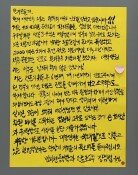The Second Berlin Declaration Might Occur during Rohs Visit to Germany
The Second Berlin Declaration Might Occur during Rohs Visit to Germany
Posted April. 05, 2005 23:27,
Ahead of President Roh Moo-hyuns visit to Germany (from April 10 to April 14), it has been continuously stated that the Korean government will make a significant suggestion, The Second Berlin Declaration, towards North Korea during his visit.
As the Korean government made a breakthrough in relations between the two Koreas through the The Berlin Declaration in April 2000, in which former President Kim Dae-jung made a promise of offering large-scale social overhead capital (SOC) to North Korea that led to the inter-Korean summit held on June 15, 2000, there has been speculation that President Roh will make some exceptional suggestions to North Korea as well. In line with the expectation, the German media reported on April 4, North Korea expects President Roh to announce a message that allows for a new relationship between South and North Korea during Rohs visit to Germany.
However, Cheong Wa Dae is not showing a positive response about the possibility of the suggestion. High-ranking officials in charge of diplomacy and security said that though they have deeply considered making a plan to announce a message at the Brandenburger Tor, which is a symbolic place of division between east and west, during Rohs visit, they concluded that the plan was not proper at this time.
A high-ranking government official said, The six-party talks have been in a deadlock, and under the situation that North Korea has contemplated its return to the negotiation table, if the Korean government provides some carrots toward North Korea, it will be able to bring about North Koreas misjudgment.
Another senior official elaborated, President Roh ordered no informal contacts with North Korea until it comes back to the talks between the two countries, which was suspended unilaterally by North Korea, adding, The North also knows President Rohs stance as well.
It has been reported that the situation of the rocky relations with the U.S and Japan was added to the governments stance. The government has judged that under the current situation of confronting Japan due to the issues of Dokdo and the distortion of history textbooks, the gains made through suggesting to North Korea in advance do not outweigh the losses, which also will lead to aggravated relations between South Korea and the U.S.
In fact, it was conveyed that when President Roh met U.S. Secretary of State Condoleezza Rice on March 20, he emphasized, Just make constructive talks with North Korea, and unless North Korea changes its attitude despite the talks, I will try to do it. This means that the Korean government still places priority on the North-U.S negotiations.
Therefore, it was said that Cheong Wa Dae will focus on pressuring Japan by highlighting the difference in methods of coping with past wrongdoings between Germany and Japan, rather than making a proposal toward North Korea, during Rohs visit to Germany. The government is considering specific plans to highlight Germanys ways of dealing with its past history, which includes the facts that former West Germany Prime Minister Billy Brant knelt down and apologized in front of the monument honoring the Holocaust victims in Warsaw, Poland, Germany acknowledged the Oder-Naiseh border, and Germany co-published a history textbook with its neighboring countries.
Jung-Hun Kim jnghn@donga.com
Headline News
- Med professors announce intention to leave hospitals starting Thursday
- Bridge honoring Sgt. Moon Jae-sik unveiled in Pennsylvania
- Chief of Staff Chung tells presidential secretaries to stay away from politics
- US FTC bans noncompete agreements
- N. Korea launches cyberattacks on S. Korea's defense companies







